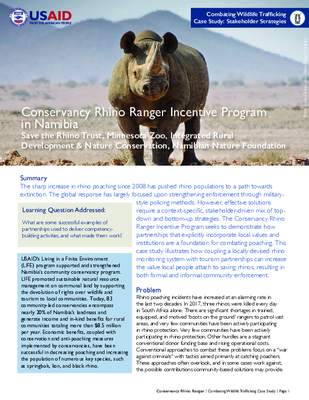Case Study: Conservancy Rhino Ranger Incentive Program in Namibia
Effective solutions to poaching require a context-specific, stakeholder-driven mix of top-down and bottom-up strategies. The Conservancy Rhino Ranger Incentive Program seeks to demonstrate how partnerships that explicitly incorporate local values and institutions are a foundation for combating poaching. This case study illustrates how coupling a locally devised rhino monitoring system with tourism partnerships can increase the value local people attach to saving rhinos, resulting in both formal and informal community enforcement.
https://biodiversitylinks.org/learning-evidence/combating-wildlife-trafficking/cwt-case-study-compilation/finalists/finalists-pdf-folder/conservancy-rhino-ranger-incentive-program-in-namibia/view
https://biodiversitylinks.org/learning-evidence/combating-wildlife-trafficking/cwt-case-study-compilation/finalists/finalists-pdf-folder/conservancy-rhino-ranger-incentive-program-in-namibia/@@download/image/image.png
File
Case Study: Conservancy Rhino Ranger Incentive Program in Namibia
Author(s):
Save the Rhino Trust
,
Minnesota Zoo
,
Integrated Rural Development & Nature Conservation
,
Namibian Nature Foundation
Publication Date: 2020
DOWNLOAD FILE
Effective solutions to poaching require a context-specific, stakeholder-driven mix of top-down and bottom-up strategies. The Conservancy Rhino Ranger Incentive Program seeks to demonstrate how partnerships that explicitly incorporate local values and institutions are a foundation for combating poaching. This case study illustrates how coupling a locally devised rhino monitoring system with tourism partnerships can increase the value local people attach to saving rhinos, resulting in both formal and informal community enforcement.


